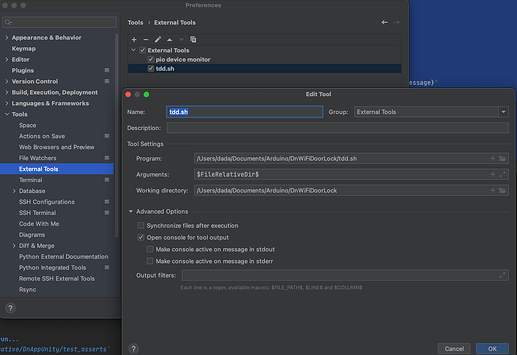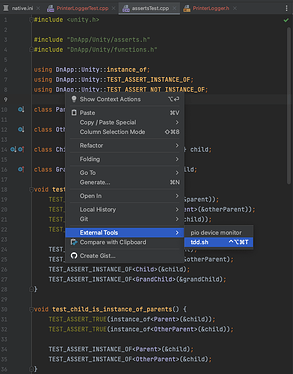Awesome idea!
Here is my implementation with filtering to specified test(s), detecting env, output coloring:
#!/bin/bash
#
# Runs test(s) on file changes.
#
# Requires `fswatch`:
# https://github.com/emcrisostomo/fswatch
#
# Pass path to test dir as the first argument.
# For CLion's External Tools you can use `$FileRelativeDir$` macro var.
#
# Env is decided automatically from first dir after test root dir.
#
# Example usage:
# * `./tdd.sh "test/native/*"`
# * `./tdd.sh "test/native/Foo/test_foo/"`
#
# Thanks to `jcw` for inspiration:
# https://community.platformio.org/t/a-new-pio-tdd-workflow/21431
# without it colors don't work in CLion's output window
export PLATFORMIO_FORCE_ANSI=true
# first argument without test dir name
test_filter=${1#"test/"}
test_filter=${test_filter#"/test/"}
if [ -n "${test_filter}" ]
then
test_filter_arg=" --filter=${test_filter}"
else
test_filter_arg=""
fi
# extract the env from the first dir
test_env=$(echo "${test_filter}" | cut -d "/" -f 1)
if [ -n "${test_env}" ]
then
test_env_arg=" -e ${test_env}"
else
test_env_arg=""
fi
test_command="pio test${test_env_arg}${test_filter_arg}"
watch_dirs="config lib src test"
font_escape="\033["
font_reset="${font_escape}0m"
font_regular_blue="${font_escape}0;34m"
font_bold_blue="${font_escape}1;34m"
font_light_gray="${font_escape}0;37m"
font_italic="${font_escape}3m"
script_name=$(basename "${0}")
waiting_message="
${font_bold_blue}\
---
${script_name}: \
waiting for changes to run...
\`\
${font_regular_blue}\
${font_italic}\
${test_command}\
${font_bold_blue}\`
---\
${font_reset}\
"
running_message="
${font_bold_blue}\
---
${script_name}: \
running...
\`\
${font_regular_blue}\
${font_italic}\
${test_command}\
${font_reset}\
${font_bold_blue}\
\`
---\
${font_reset}
"
echo -e "${running_message}"
$test_command
echo -e "${waiting_message}"
is_not_temporary_file () {
# checking the last char of the first argument
[[ "${1: -1}" != "~" ]]
}
fswatch --latency 0.1 --recursive ${watch_dirs} |
while read -r changed_file; do
if is_not_temporary_file "${changed_file}"; then
echo -e "${font_light_gray}File changed: \`${changed_file}\`${font_reset}"
echo -e "${running_message}"
$test_command
echo -e "${waiting_message}"
fi
done
As a bonus, it can be added to External Tools in CLion:
That way we can easily activate it using a shortcut, while editing the test file:

